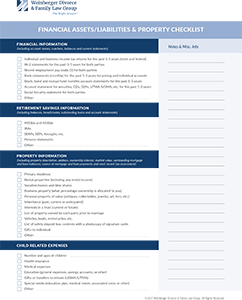PREPARING TO MEET WITH YOUR FAMILY LAW OR DIVORCE ATTORNEY
By: Bari Z. Weinberger, Esq.
At an initial meeting with your family law or divorce lawyer, depending upon the purpose of the meeting, you will want to have information and documents available in order to maximize the value that you will receive from the meeting. The more information that you bring to the meeting in the form of physical records and documents, the more likely we, your lawyers, can educate you about your specific situation as opposed to discussing issues in mere generalities.
The following check list offers you a guide to help you gather pertinent information for your initial or even follow-up meeting with your lawyer. The list is not meant to be overwhelming or to cause you stress. A productive meeting can take place even without having these documents produced. However, for us to best assess your unique circumstances and for you to gain the most from our meeting, it is recommended that you to bring as many financial records and informational details as set forth on the list that you can possibly obtain.
To help you get prepared, download and print out our multi-purpose, helpful Financial Information Checklist. It aligns with much of the information listed here:
Financial Information
(including account names, numbers, balances and current statements)
- Individual and business income tax returns for the past 3-5 years (state and federal)
- W-2 statements for the past 3-5 years for both parties
- Recent employment pay stubs (3) for both parties
- Bank statements (monthly) for the past 1-3 years for joint and individual accounts
- Stock, bond and mutual fund monthly account statements for the past 1-3 years
- Account statements for annuities, CDs, 529s, UTMA/UGMA, etc. for the past 1-3 years
- Social Security statement for both parties
Retirement Savings Information
(including balances, beneficiaries, outstanding loans and account statements)
- 401(k)s and 403(b)s
- IRAs
- SERPs, SEPs, Keoughs, etc.
- Pension statements
Property Information
(including property description, address, ownership interest, market value, outstanding mortgage and loan balances, source of mortgage and loan payments and most recent tax assessment)
- Primary residence
- Rental properties (including any rental income)
- Vacation homes and time shares
- Business property (what percentage ownership is allocated to you?)
- Personal property of value (antiques, collectables, jewelry, art, furs, etc.)
- Inheritance (past, current or anticipated)
- Interests in a trust (current or future)
- List of property owned by each party prior to marriage
- Vehicles, boats or other recreational vehicles
- List of safety deposit box contents with a photocopy of signature cards
Bills and Outstanding Debt
(including balances, statements, source of payments/funds)
- Credit card statements whether joint or individual for 1-3 years
- Loan documents
- Leases on vehicles
- Tax liens / debts due to the IRS
- Utility bills for past 1-3 months
- Money due to third parties on Notes Payable
- Student Loans / tuition. etc.
- Outstanding medical bills
- Arrears on prior support orders and agreements (child support/ alimony)
- Monthly budget worksheet (Quick Books, Quicken, Case Information Statement)
Legal Agreements
- Wills
- Living wills
- Powers of attorney
- Advance healthcare directive, healthcare proxy
- Pre-nuptial agreement, post-nuptial agreement
- Divorce Judgments/Agreements or child support Orders from a previous marriage
- Business partnership agreements, records, books
Insurance Documents and Information
(include statements where available) You should consider thinking ahead about certain issues that may be applicable to your situation including:
- Health Insurances – carrier name, policy and group numbers, persons covered
- Life Insurances – carrier name, policy number, face amount, cash value, insured, and beneficiaries
- Auto Insurance- carrier name, policy number, vehicles covered, insured, term period
- Homeowner’s Insurance- carrier name, policy number, residence covered
- Long Term Care insurance- carrier name, policy number, insured
- Disability insurance- carrier name, policy number, insured
You should consider thinking ahead about certain issues that may be applicable to your situation including:
- Child custody (which parent will serve as the primary residential parent?)
- Visitation plan (fill out a blank calendar with your initial thoughts as to scheduling)
- Marital home (will you remain living in the house, sell the home or have the other party buy-out your interest?)
- Beneficiaries of insurance policies and other benefits (how will they change?)
- Spousal support / alimony (is this a factor?)
- Attorney’s fees and expenses (from what source will these be paid?)
- Asset and debt division- (how do you envision a reasonable resolution?)


